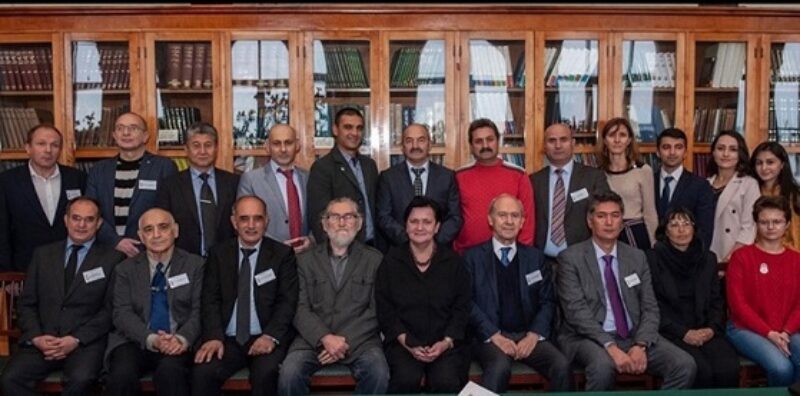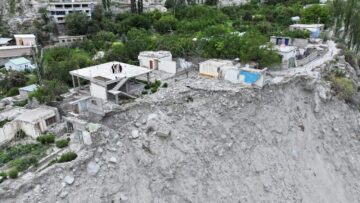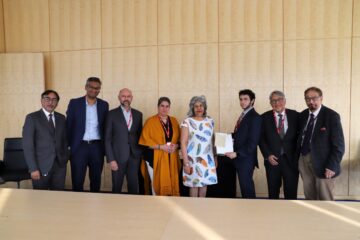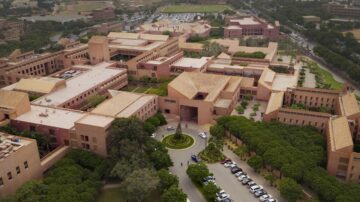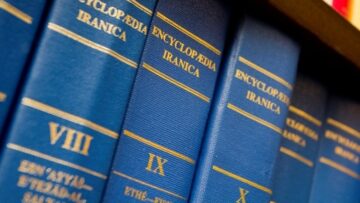Wladimir A. Ivanow (1886–1970), the celebrated Russian academic who paved the way for modern scholarship on Ismaili and Iranian linguistic Studies was the inspiration behind many of the papers presented at the flagship conference entitled Intellectual Traditions of IsmailisAdherents of a branch of Shi’i Islam that considers Ismail, the eldest son of the Shi’i Imam Jaʿfar al-Ṣādiq (d. 765), as his successor. and Sufis, held at the Russian Academy of Sciences Institute of Oriental Manuscripts in St Petersburg, on 10 – 11 October 2019.
Since the 1930s, Ivanow was the moving force behind the modern progress in Ismaili studies. He devoted his attention to the study of Nizari Ismailis, and to date, his work continues to be the foundation for further studies in almost every major field of Ismailism. Ivanow’s recovery and analysis of previously unavailable Ismaili manuscripts was a major breakthrough in the study of this often-misrepresented Shi‘i Muslim community. He identified, recovered, edited, translated and assiduously studied a good portion of the extant literature related to the Nizari Ismailis.
It was therefore befitting that The Institute of Ismaili Studies partnered with the Institute of Oriental Manuscripts to host this academic conference in honour of Wladimir A. Ivanow. During the two day conference, both Russian and English speaking scholars examined aspects of Sufi and Ismaili traditions and the emergence of rich devotional, literary and artistic expressions as a result of the interactions of these traditions.
Dr Farhad Daftary, Co-Director of IIS, delivered the keynote address and spoke about the importance of the ground-breaking research conducted by Ivanow and its impact on modern day scholars. He remarked:
Very few fields of Islamic studies have seen so much change in such a short period of time as Ismaili studies. The role of Ivanow was uniquely outstanding in terms of bringing about this change. Through his pioneering research and numerous contributions, the Nizari Ismailis of the Alamut period are no longer judged on the basis of mediaeval Crusader legends. Ivanow not only recovered, collected and published research on Ismaili manuscripts, but he also made these manuscripts available to other scholars, who were becoming interested in this new field of study and wanted to gain new knowledge. Ivanow can truly be regarded as the founder of modern Nizari Ismaili studies – a field that owes its genesis, to a very large extent, to his pioneering work.
In addition to Dr Daftary’s keynote address, a further three scholars from the IIS presented their papers at the conference, sparking positive discussions amongst the academics in attendance. Dr Hakim Elnazarov, Coordinator of the Central Asian Studies Unit at IIS, showcased his research on Sufism and Central Asian Ismailism. His paper traced the ritualistic aspects of the traditional practices of the Central Asian Ismailis back to the pre-Islamic period and how these rituals have taken on Islamic forms, Islamic beliefs and interpretations over time. Dr Janis Esots, Research Associate in IIS’s Shi‘i Studies Unit, presented his paper Wladimir Ivanow on the Relationship of Sufism and Ismailism: The Case of Laʿl Shahbāz Qalandar. Through his case study, Dr Esots explored Ivanow’s interest in Sufism and how he believed that many facets of Sufism could be explained through Ismaili influences. Dr Daryoush Mohammad Poor, Senior Research Associate in the Department of Academic Research and Publications at IIS, presented his work on Nizari Ismailis and Sufis before the Mongol Invasion. In this paper, he made a comparative assessment of the Nizari doctrine of qiyāmat alongside similar views of ʿAyn al-Quḍāt Hamadānī. A close examination of both texts revealed that the almost identical nature of these expositions made it difficult to recognise one from the other.
A number of other interesting research papers were also presented, by Aleksey Khismatulin, from the Institute of Oriental Manuscripts, who discussed Devices of Anti-Shia and Anti-Ismaili Ideology in the Administrative Literature of Saljūqs, while Leila Dodykhudoeva from the Institute of Linguistics, presented her paper on the Confessional and Regional Aspects of Meaning of the Term ‘Pir’.
The conference culminated with a book launch of the Russian edition of Wladimir Ivanow’s memoirs entitled, Fifty Years in the East, edited by Dr Farhad Daftary. Fifty Years in the East is a translation and commentary on Ivanow’s memoirs written in 1968. This work, originally written in Russian, comprises of an autobiography and vivid accounts from his travels. The memoirs, written in Tehran during Ivanow’s final years, have been edited with substantial annotations by Dr Daftary. They reveal the circumstances under which modern Ismaili studies were initiated and an eyewitness account of life in several regions during the early decades of the twentieth century, before the rapid onset of modernisation. The memoirs include 60 illustrations of Ivanow’s associates and the places that he visited, as well as a comprehensive bibliography of 160 works by Wladimir A. Ivanow.
Alongside the conference and book launch, an exhibition of photographs related to the life and work of Ivanow was also curated for the delegates at the House of Nationalities in St. Petersburg.

